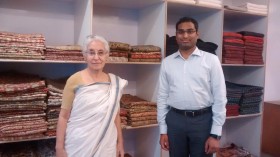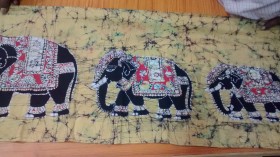SAI’s Livelihood Creation project is underway on the ground in India. The research project, supported by the Tata Trusts, aims to build knowledge and capacity around three key areas: rural livelihood creation (emphasis on the handicrafts and handloom sectors); educational, social and economic empowerment of women; and science and technology-based interventions for poverty alleviation.
By Shashank Shah, Project Director
Last week’s field visits took our team to two states in Southern India. The first leg of this journey was to the capital city of the southern-most state of Tamil Nadu. Known for its rich culture and heritage that is visible in every aspect of daily life, Chennai is verily the capital of South Indian traditions and customs. The SAI Team met with two organizations focused on the crafts sector.
- Panchaksharam, Secretary and CEO of SIPA (South Indian Producers Association), explained to the SAI Team how the organization was founded back in 1985. The office is situated in a place called Anakaputhur, a suburb of Chennai that was once famous for its traditional weaving business. SIPA does not have any in-house production facilities. Instead, it connects various artisan groups and buyers by purchasing from artisans and selling the products to various buyers under SIPA branding. It operates in all South-Indian states (Tamil Nadu, Andhra Pradesh, Karnataka, Kerala, and Telangana). In these states it also conducts various capacity building programs for different NGOs and producer groups. Over 15,000 artisans have been benefited from SIPA’s association over the last 30 years. It has been a proactive advocate of Fair Trade practices in South India.
- Visalakshi Ramaswamy, Founder and Managing Trustee of the MRMRM Cultural Foundation spoke about the work the foundation does in Chettinad (a cluster of 75 villages between Trichy and Madurai in southern Tamil Nadu). This non-profit organization does something that very few organizations in this sector have attempted to do: documents an entire craft-form and publishes the research in the form of books for preservation. It also works towards the revival of the craft and in the process creates livelihood opportunities for people in those villages. A unique practice of this organization is the year-long training it gives to its artisans before they start contributing full-time to production.
From Tamil Nadu, the SAI Team headed to a capital city – Telangana. Hyderabad has the unique distinction of bearing multiple identities. A blend of Islamic and Indic cultures, Hyderabad is now famous for its Infotech parks and Biotech Parks. In the midst of this diversity and transition, our team identified two committed organizations in the crafts sector.
- The first visit was to Dastkar Andhra, an off-shoot of Dastkar Delhi. This organization has multiple wings for taking care of sourcing, wholesale, and retail sales. Their work even attracts the attention of the Government of Andhra Pradesh (the parent state from which Telangana was carved out in 2014), which approaches them to conduct capacity building workshops for organizations in this sector. Dastkar Andhra has actively promoted the use of natural dyes and reactive chemical dyes, which are safer than regular chemical dyes. Syama Sundari, a management team member, explained to the SAI team how the organization has changed the lives of many families which were earlier not part of India’s economic growth story. The organization has operations in various districts across the twin states of Telangana and Andhra Pradesh, which have Hyderabad as its joint capital until 2024. By then, the new capital of Amaravati for the state of Andhra Pradesh would be ready for occupation and administration.
- The SAI team’s second visit was to Malkha, an organization that involves itself at very early stages of the value-chain by producing cotton yarn, and continues its involvement right up to the sale of the cloth. Uzramma, who spearheads Malkha, explained how cotton lint that goes into the making of Malkha yarn does not undergo baling and unbaling. This preserves the elasticity and absorbency of natural cotton. Malkha encourages production at a decentralised level and believes in the importance of the pre-loom infrastructure for better production. Even though Malkha is a young organization (the initiative started informally in 2003), it has already created a lot of impact in the villages it works in by helping artisans double their incomes in many cases.
In the next week, our Team will share their experiences in the East-Indian states of Odisha and West Bengal.


